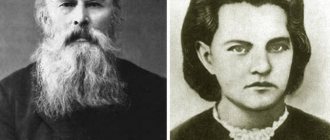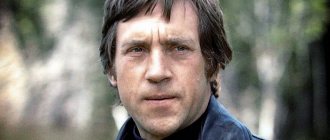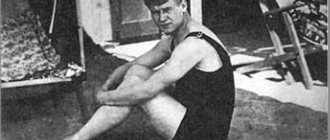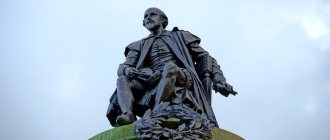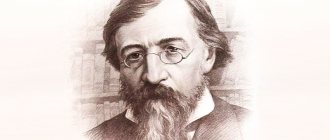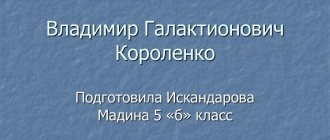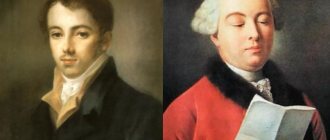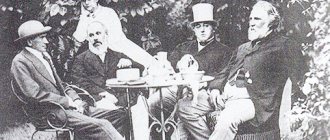Nikolai Alekseevich Zabolotsky is a Soviet poet, translator, member of the Union of Writers of the USSR. In 1938 he was arrested and repressed. In 1963, he was rehabilitated at the request of his wife.
Over the years of his biography, Zabolotsky had to endure many troubles, spending many years in prisons and labor camps.
So, here is a short biography of Nikolai Zabolotsky (read interesting facts from Zabolotsky’s life here).
Biography of Zabolotsky
Nikolai Zabolotsky was born on April 24 (May 7), 1903 in the Kizichey settlement of the Kazan province.
His father Alexei Agafonovich was the head of a farm, and his mother Lidiya Andreevna taught at a local school.
Childhood and youth
Already in his third year at school, Nikolai began publishing a magazine in which his poems were published. During his biography from 1913 to 1920, he lived in the city of Urzhum, where he entered a real school.
In addition to poetry, he was also interested in history, chemistry and drawing.
As a teenager, Zabolotsky was interested in the works of Alexander Blok. After graduating from college, he successfully passed the exams at Moscow University, choosing the medical and historical-philological faculties.
Soon Nikolai decides to move to Petrograd, where he enters the local institute in the department of language and literature. In 1926, the poet was called up for service.
“The intention to become a writer became stronger in me”
Nikolai Zabolotsky before his family moved to Sernur. Illustration from Nikita Zabolotsky’s book “The Initial Structure of His Soul: To the Biography of N.A. Zabolotsky". Almanac of a bibliophile, issue 22, Moscow, 1987
Parents of Nikolai Zabolotsky - Alexey and Lydia Zabolotsky (in the center in the top row) in a circle of relatives and friends on the porch of their house. Illustration from Nikita Zabolotsky’s book “The Initial Structure of His Soul: Towards the Biography of N.A. Zabolotsky". Almanac of a bibliophile, issue 22, Moscow, 1987
Nikolai Zabolotsky in childhood. August 17, 1913. Urzhum, Kirov region. Photo: persons-info.com
Nikolai Zabolotsky was born in 1903 on a farm near Kazan. His father, Alexey Zabolotsky, worked as an agronomist, managed a private farm and introduced new farming methods to increase yields. In 1905, he opened courses for beekeepers, where he himself taught. The mother of the future poet, Lydia Dyakonova, taught at a rural school. After marriage, she left her job and raised six children. Nikolai Zabolotsky was the eldest of them.
There were many books in the house. Zabolotsky recalled: “Since 1900, my father subscribed to Niva, and little by little, from the supplements to this magazine, he compiled a decent collection of Russian classics, which he carefully bound and increased with random purchases. This father’s closet became my favorite mentor and educator from early childhood.” The children spent a lot of time outdoors. My father often took Nikolai Zabolotsky to the field, showing him how to properly plant and care for them.
In 1910, the father found a new job, and the family moved to the village of Sernur, Urzhum district (now the territory of the Mari El Republic). The poet wrote: “My first indelible impressions of nature are associated with these places. I heard plenty of nightingales there, saw plenty of sunsets and all the chaste charm of the plant world.” At the age of seven, Nikolai Zabolotsky composed his first poem, and soon decided to become a writer. He read a lot, and then retold the plot of the book to his friends in the village. In 1912, when Russia celebrated the 100th anniversary of the victory in the Patriotic War, the future poet talked about the life of Napoleon, commanders Mikhail Kutuzov and Mikhail Barclay de Tolly. The poet recalled: “We, children, were very interested in stories about this war. In the summer we played war all day long: we made ourselves a cocked hat out of paper, out of sticks - sabers, lances, guns, and bravely fought with nettles, which represented the French.”
In 1913, Nikolai Zabolotsky entered the Urzhum Real School. His favorite subjects were history, drawing and chemistry: with his father’s permission, the future poet conducted experiments in the barn on weekends. Zabolotsky did not give up literature either: he read and wrote a lot himself. He was especially fascinated by the poems of Alexander Blok and Konstantin Balmont. In his senior years, he composed the poem “Urzhumiada” about life in the village of Sernur. In 1917, when the revolution began, representatives of the capital's intelligentsia came to the district to campaign for Soviet power: musicians, teachers, actors. Zabolotsky recalled: “Some of them encouraged my literary experiments, advised me to work more, to go to the center. The intention to become a writer became stronger in me.”
Poetry
After serving in the army for only a year, Zabolotsky was sent to the reserve. However, this time was enough for him to look at life with different eyes. If before the army the young man’s poems glorified nature and the countryside, now he began to look at the world more broadly.
Nikolai Zabolotsky in his youth
Immersing himself headlong in writing, Nikolai created his own style of storytelling. Since at that moment the NEP (New Economic Policy of 1921-1928) was in effect in the country, the poet could not stay away from the events taking place.
In 1929, Zablotsky published his collection “Columns,” the poems in which were imbued with irony and sarcasm. The book was immediately subjected to harsh criticism from the press, which accused its author of “fooling over collectivization.”
Despite the endless persecution, Zablotsky was able to establish cooperation with the publication Zvezda, where he continued to publish for some time.
Nikolai Zabolotsky’s new work “The Triumph of Agriculture” caused another portion of criticism against him. He soon realized that Soviet censorship simply would not allow him to realize himself. His poems, permeated with grotesqueries, parodies and satire, were subject to endless attacks from critics.
For this reason, Nikolai Alekseevich did not see the point in continuing to write poems in his usual manner. His main source of income was working in the magazines of Samuil Marshak (see interesting facts about Marshak), where the poet’s children’s poems were published. In addition, he was also engaged in translation activities.
Zabolotsky’s latest works received positive reviews, and therefore he published a poetry collection, “The Second Book.” During this period of his biography, he worked hard on composing the poem “The Siege of Kozelsk”, and also continued to translate the works of foreign authors. It seemed that life was beginning to get better, but prosperity was replaced by serious trials.
The army and the beginning of a poetic career
- In 1926, Nikolai Zabolotsky was called up for military service . The army atmosphere and work in a military wall newspaper made the poet’s work more serious and original.
- After a year of service, in 1927, Zabolotsky retired to the reserve and returned to Leningrad, where, together with D. Kharms, A. Vvedensky and other writers and poets, he participated in the creation of the literary group OBERIU (Association of Real Art). In addition, he worked in the Leningrad publishing house under the leadership of S. Marshak.
- 1929 was marked by the release of Zabolotsky’s first collection of poems, called “Columns” . It included 22 satirical works in which the poet ridiculed collectivization and old traditions preserved in the new Soviet society. The collection quickly gained popularity, but the reaction of critics was extremely ambiguous: the poet was accused of “foolishness.”
- For some time, Zabolotsky’s works were published in the magazine “Zvezda” , where he got a job with the help of his friend, poet Nikolai Tikhonov. Here, in 1933, his poem “The Triumph of Agriculture” was published, and in 1937, a second collection of poems.
- In 1931, the poet corresponded with the great Soviet scientist K. E. Tsiolkovsky . This communication made an indelible impression on Zabolotsky and helped develop ideas about the union of man and nature.
Personal life
In 1930, Nikolai Zabolotsky married Ekaterina Klykova. The wife supported her husband in every possible way, and even during his arrest she continued to correspond with him. Initially, their marriage could be considered exemplary, but later their feelings for each other cooled.
In 1955, Catherine left Nikolai for the writer Vasil Grossman. In turn, Zablotsky began to court Natalya Roskina. However, after 3 years, Klykova returned to her husband, after which the couple never separated.
Nikolai Zabolotsky with his wife Ekaterina Klykova and daughter Natalya
In this marriage, the Zabolotskys had a son, Nikita, and a daughter, Natalya. An interesting fact is that, having matured, Nikita will become a candidate of biological sciences, and Natalya will marry academician Nikolai Kaverin, the son of the famous writer Veniamin Kaverin.
Interesting Facts
- The 40s were a turning point in Zabolotsky’s work - the poet moved from avant-garde works to classical philosophical poems.
- Nikolai Alekseevich is the largest translator of Georgian poets - Sh. Rustaveli, D. Guramishvili, V. Pshavely, Gr. Orbeliani, A. Tsereteli, I. Chavchavadze. Zabolotsky also translated the works of the Italian poet U. Saba, revised for children the translation of F. Rabelais’ book “Gargantua and Pantagruel”, etc.
- In 1930, Zabolotsky married Ekaterina Vasilievna Klykova, a graduate of the St. Petersburg Pedagogical Institute. They had two children.
- Zabolotsky was indelibly impressed by Tsiolkovsky’s works, which revealed the idea of the diversity of life forms in the Universe. In addition, Nikolai Alekseevich was fond of the works of A. Einstein, F. Engels, K. Timiryazev, G. Skovoroda, Yu. Filipchenko, V. Vernandsky, N. Fedorov.
Previous
BiographiesVitas short biography of the singer
Next
BiographiesJean Louis Gericault (Jean Louis Gericault) brief biography of the artist
Death
In the last years of his biography, Nikolai Zablotsky received great recognition and had everything necessary for a normal existence. However, his time in the camps seriously damaged his health.
In addition, when he learned that his wife had left him, he suffered the first heart attack in his life. Three years later, the poet suffered a second heart attack, which became fatal for him.
Nikolai Alekseevich Zablotsky died on October 14, 1958 at the age of 55, finding peace at the Novodevichy cemetery.
Arrest and exile
On charges of anti-Soviet propaganda, which was fabricated from critics' reviews and denunciations that had little to do with the true themes of the poet's work, the poet was arrested in 1938. Attempts to pin the organization of a conspiracy association on him and sentence him to death did not yield results; despite the torture, the poet did not agree to sign false accusations. The events of this period are told by the poet in “The History of My Imprisonment” (the memoirs were published abroad in 1981, and in the USSR in 1988).
Zabolotsky spent 5 years in camps in the Far East, then two years (1944-46) in Karaganda. There the poetic translation of “The Tale of Igor’s Campaign” was completed.
The 40s became a turning point not only in the life, but also in the work of the poet. From avant-garde works of the early period, full of sarcasm, irony, and various allusions, he moves on to classical poetry with simple and understandable images and situations.
